Unit 2 核心考点精讲精练-八年级英语下册同步精品课件(人教版)
文档属性
| 名称 | Unit 2 核心考点精讲精练-八年级英语下册同步精品课件(人教版) | 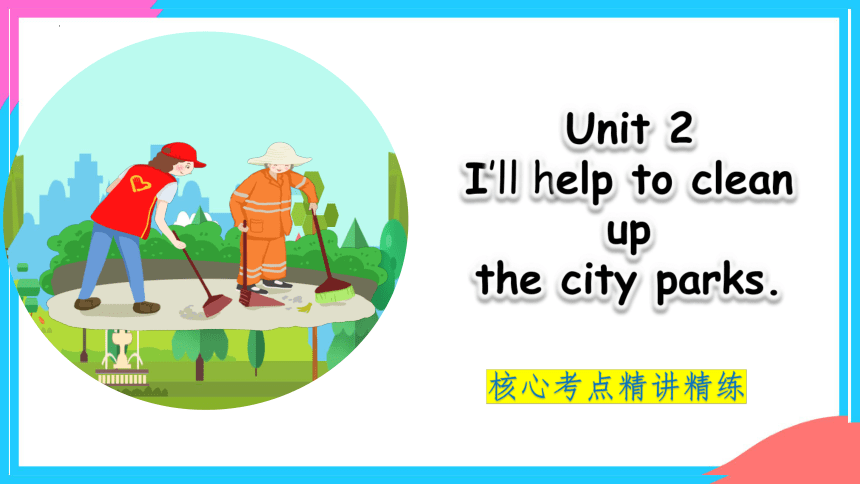 | |
| 格式 | pptx | ||
| 文件大小 | 3.0MB | ||
| 资源类型 | 试卷 | ||
| 版本资源 | 人教新目标(Go for it)版 | ||
| 科目 | 英语 | ||
| 更新时间 | 2024-03-12 07:47:15 | ||
图片预览

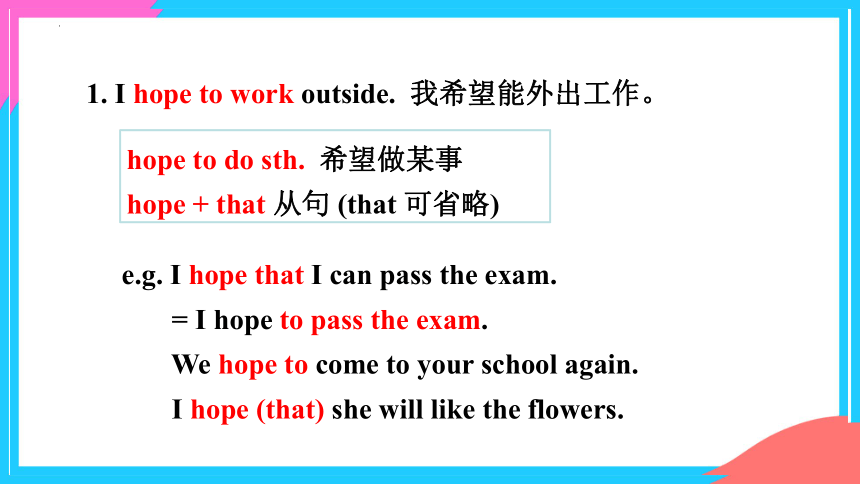
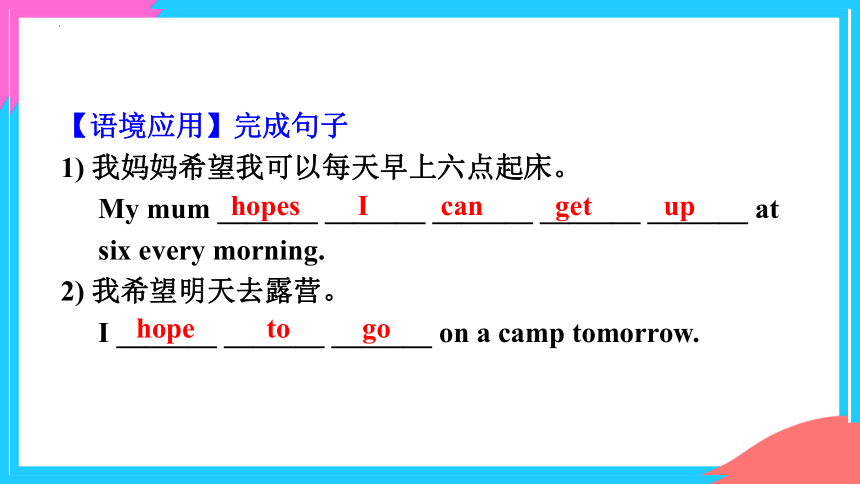
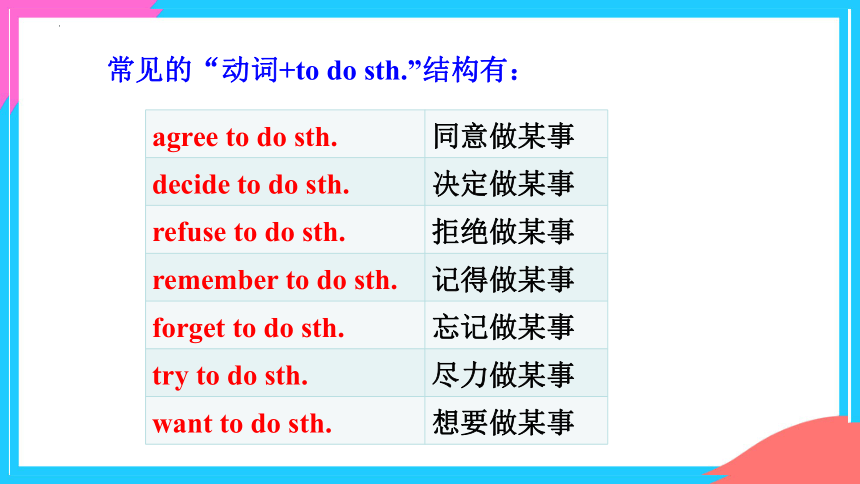
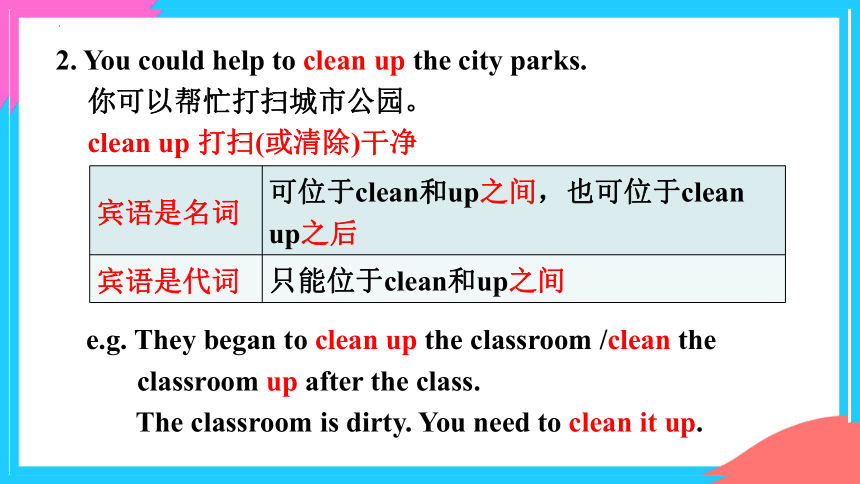
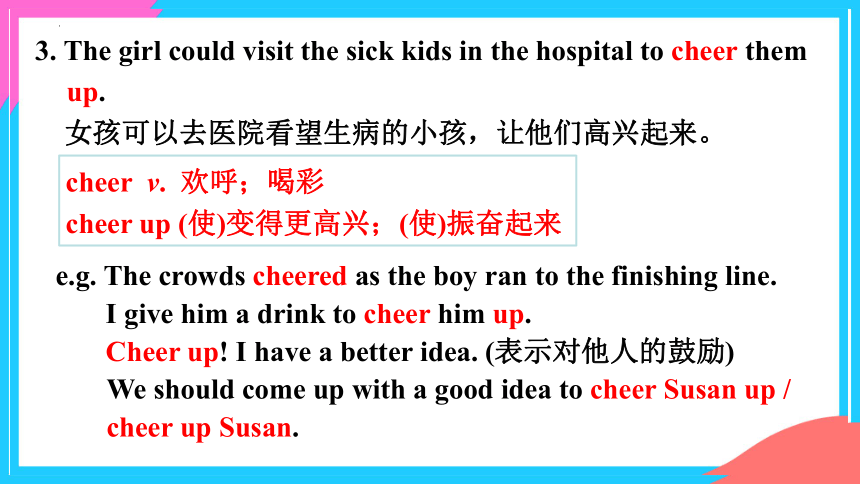
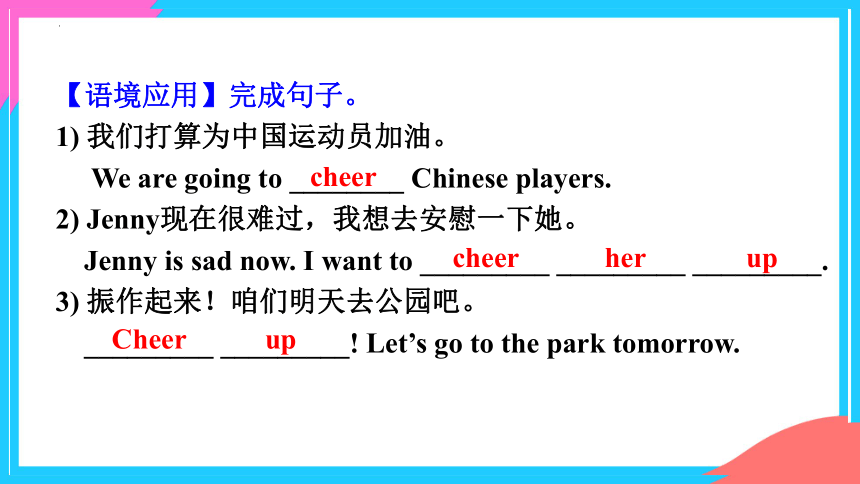
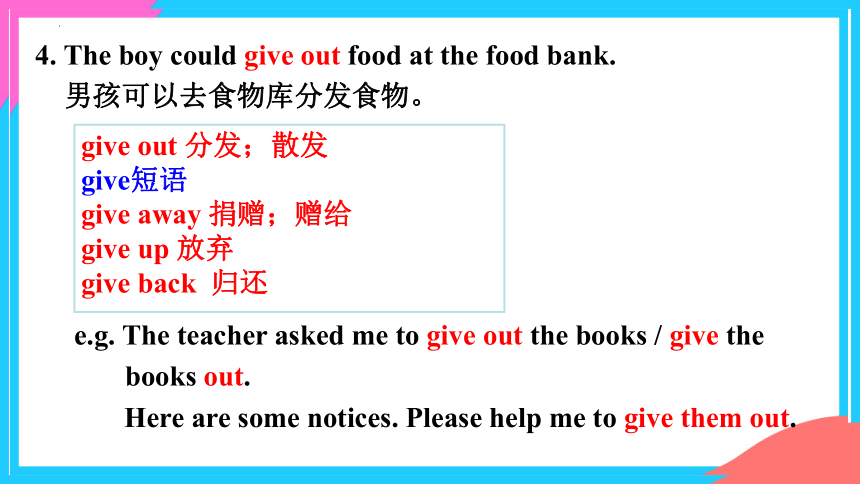
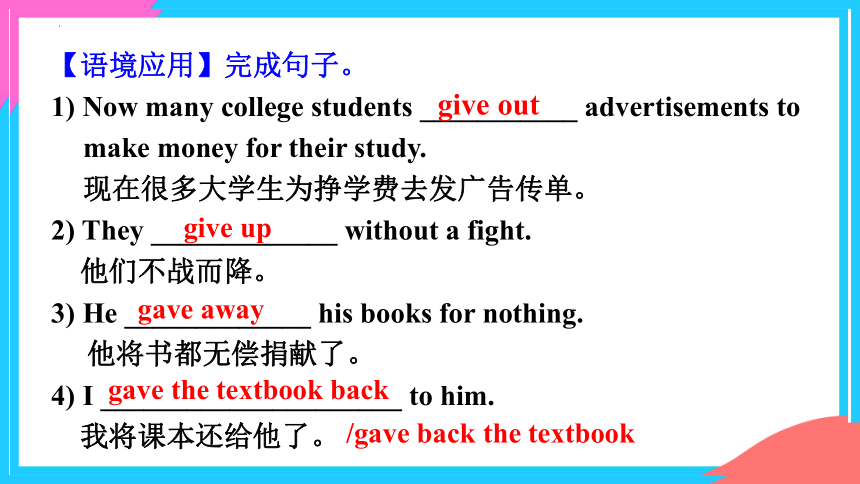
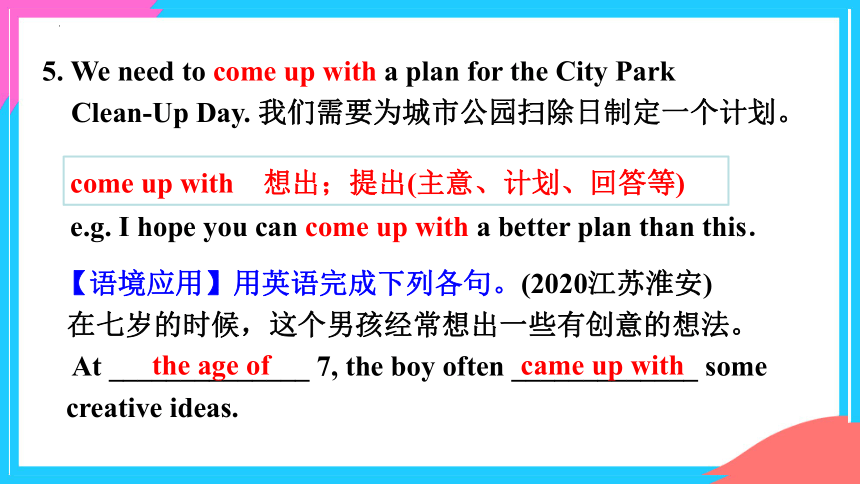
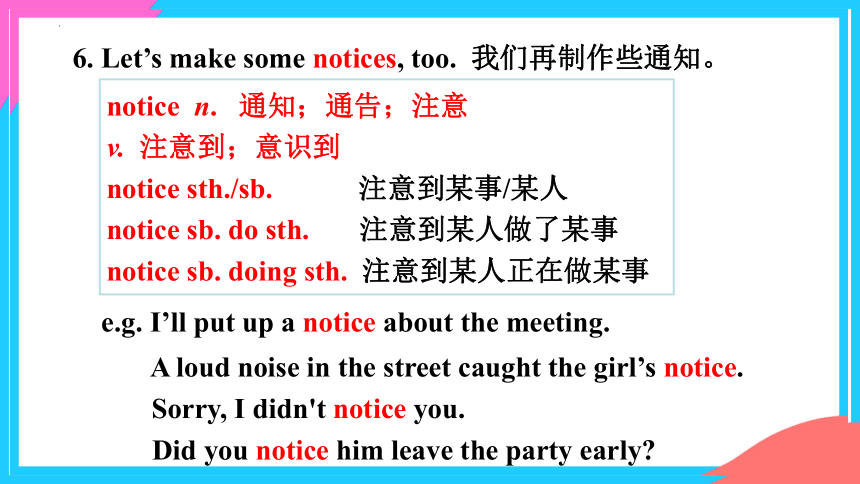
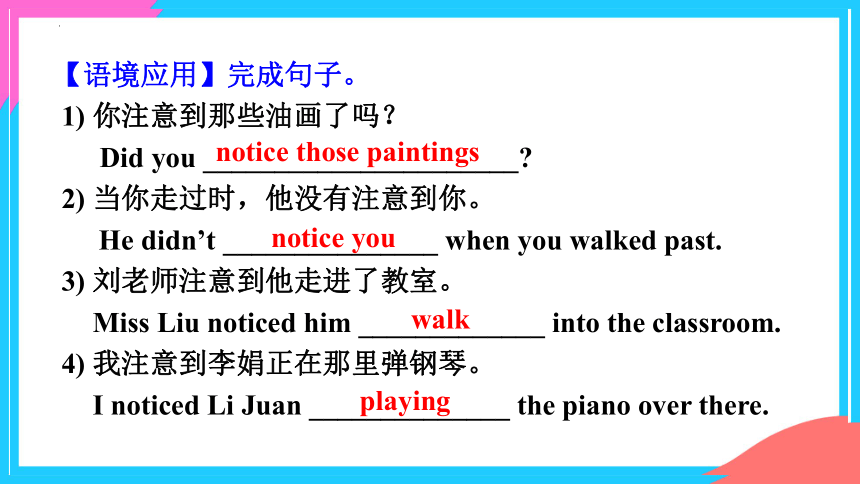
文档简介
(共54张PPT)
Unit 2
I’ll help to clean up
the city parks.
核心考点精讲精练
1. I hope to work outside. 我希望能外出工作。
hope to do sth. 希望做某事
hope + that 从句 (that 可省略)
e.g. I hope that I can pass the exam.
= I hope to pass the exam.
We hope to come to your school again.
I hope (that) she will like the flowers.
【语境应用】完成句子
1) 我妈妈希望我可以每天早上六点起床。
My mum _______ _______ _______ _______ _______ at six every morning.
2) 我希望明天去露营。
I _______ _______ _______ on a camp tomorrow.
hopes I can get up
hope to go
常见的“动词+to do sth.”结构有:
agree to do sth. 同意做某事
decide to do sth. 决定做某事
refuse to do sth. 拒绝做某事
remember to do sth. 记得做某事
forget to do sth. 忘记做某事
try to do sth. 尽力做某事
want to do sth. 想要做某事
2. You could help to clean up the city parks.
你可以帮忙打扫城市公园。
clean up 打扫(或清除)干净
宾语是名词 可位于clean和up之间,也可位于clean up之后
宾语是代词 只能位于clean和up之间
e.g. They began to clean up the classroom /clean the classroom up after the class.
The classroom is dirty. You need to clean it up.
3. The girl could visit the sick kids in the hospital to cheer them up.
女孩可以去医院看望生病的小孩,让他们高兴起来。
e.g. The crowds cheered as the boy ran to the finishing line.
I give him a drink to cheer him up.
Cheer up! I have a better idea. (表示对他人的鼓励)
We should come up with a good idea to cheer Susan up / cheer up Susan.
cheer v. 欢呼;喝彩
cheer up (使)变得更高兴;(使)振奋起来
【语境应用】完成句子。
1) 我们打算为中国运动员加油。
We are going to ________ Chinese players.
2) Jenny现在很难过,我想去安慰一下她。
Jenny is sad now. I want to _________ _________ _________.
3) 振作起来!咱们明天去公园吧。
_________ _________! Let’s go to the park tomorrow.
cheer
cheer her up
Cheer up
4. The boy could give out food at the food bank.
男孩可以去食物库分发食物。
e.g. The teacher asked me to give out the books / give the books out.
Here are some notices. Please help me to give them out.
give out 分发;散发
give短语
give away 捐赠;赠给
give up 放弃
give back 归还
【语境应用】完成句子。
1) Now many college students ___________ advertisements to make money for their study.
现在很多大学生为挣学费去发广告传单。
2) They _____________ without a fight.
他们不战而降。
3) He _____________ his books for nothing.
他将书都无偿捐献了。
4) I _____________________ to him.
我将课本还给他了。
give out
give up
gave away
gave the textbook back
/gave back the textbook
5. We need to come up with a plan for the City Park
Clean-Up Day. 我们需要为城市公园扫除日制定一个计划。
e.g. I hope you can come up with a better plan than this.
【语境应用】用英语完成下列各句。(2020江苏淮安)
在七岁的时候,这个男孩经常想出一些有创意的想法。
At ______________ 7, the boy often _____________ some creative ideas.
the age of came up with
come up with 想出;提出(主意、计划、回答等)
6. Let’s make some notices, too. 我们再制作些通知。
e.g. I’ll put up a notice about the meeting.
A loud noise in the street caught the girl’s notice.
Sorry, I didn't notice you.
Did you notice him leave the party early
notice n. 通知;通告;注意
v. 注意到;意识到
notice sth./sb. 注意到某事/某人
notice sb. do sth. 注意到某人做了某事
notice sb. doing sth. 注意到某人正在做某事
【语境应用】完成句子。
1) 你注意到那些油画了吗?
Did you ______________________
2) 当你走过时,他没有注意到你。
He didn’t _______________ when you walked past.
3) 刘老师注意到他走进了教室。
Miss Liu noticed him _____________ into the classroom.
4) 我注意到李娟正在那里弹钢琴。
I noticed Li Juan ______________ the piano over there.
notice those paintings
notice you
walk
playing
7. They told me stories about the past and how things used to be.
他们给我讲过去的生活经历,讲过去是什么样子的。
What’s the meaning of “be used to (doing) sth. ”
used to be / live / have / stay / love等,表示过去存在但现在消失的某种情形,“曾经,曾”。
used to + 动词原形 “过去常做某事” (暗指现在不那样了)
e.g. She used to live in London.
He used to arrive late last year, but now he doesn’t.
Did you use to sing when you took a shower
【语境应用】完成句子。
1) Jenny过去每天早上五点起床。
Jenny _______________ at 5:00 every morning.
2) 现在我爷爷习惯住在乡下。
Now my grandpa _______________ in the countryside.
used to get up
is used to living
8. We should listen to them and care for them.
我们应该倾听他们,照顾他们。
e.g. The children are old enough to care for themselves.
Would you care for a walk
She thinks only of herself and doesn't care about others.
care for 照顾 (=look after / take care of);
非常喜欢 (=like / love)
care about 关心;在意
【语境应用】词语释义。
I can’t go to the cinema with you because I have to stay at home and care for my sick sister.
A. take care B. like
C. worry about D. look after
1. Mario Green and Mary Brown from Riverside High School give up several hours each week to help others.
河畔中学的Mario Green和Mary Brown每周腾出几个小时来帮助他人。
He volunteers at an animal hospital every Saturday morning.他每周六上午在一家动物医院做义工。
each, every 每个,各
很多时候,两词可以互换使用,但意思略有差别:
each 形容词 指两个或两个以上的人或物中的“每一个”,强调个体,用作代词时可与of连用 Each school has its own library.
每一所学校都有自己的图书馆。
Each of the companies supports a local charity.
这些公司都各自资助一个当地的慈善组织。
He gave two to each.
他给了每人两个。
代词 every 形容词 指三个或三个以上的人或物中的“每一个”,强调整体,不 能与of连用 Every child was dressed in a costume.
所有孩子都穿了演出服。
被every和each修饰的名词或者each用作代词作主语时,谓语动词用单数形式。
【语境应用】根据句意选用each或every填空。
1) ____________ room is clean.
2) There are many trees on _______ side of the road.
3) _______ of the boys can play soccer.
Every/Each
each
Each
2. “It’s hard work,” he says, but I want to learn more about how to care for animals.
“这活儿很难,”他说,“但是我想更多地了解如何照顾动物。”
e.g. They don’t know where they can build the new house.
= They don’t know where to build the new house.
他们不知道在哪里可以建新房。
I can't decide what to do next.
我决定不下来下一步该做什么。
how to care for animals “疑问词+ to不定式”,构成复合不定式结构,作介词about的宾语。
3. I get such a strong feeling of satisfaction when I see the animals get better and the look of joy on their owners’ faces.
句意:
每当我看到那些动物们好起来,还有他们主人脸上喜悦的表情,一种强烈的满足感便油然而生。
when引导的时间状语从句
get vt. 产生,形成,常与feeling, idea等搭配
get link v. (系动词) 变得,变成,后接形容词,表示体质、情绪、天气等方面的改变
【语境应用】判断下列句子中get的词性及划线部分的意思。
1) Do you get the feeling that we’re not welcome here
2) It’s getting hotter now.
3) He got angry with me after that.
4) How did you get such an idea
get vt. 感觉
get link v. 变得热起来
get link v. 和……生气
get vt. 产生这样一个想法
such 形容词 such+a/an+形容词+可数名词单数
so 副词 so+形容词+a/an+可数名词单数
名词前有many, much, few, little修饰时,要用so,不用such。 such/so
e.g. She is such a pretty girl. = She is so pretty a girl.
I didn’t realize I had so many friends.
satisfaction n. 满足;满意(不可数)
令人满意或欣慰的事(可数)
a feeling of satisfaction 满足感
to one's satisfaction 令某人满意的是
e.g. She smiled in satisfaction.
她满意的笑了。
To his parents’ satisfaction, Tom always finishes his homework by himself.
令他父母满意的是,Tom总是自己完成作业。
【语境应用】完成句子。
1) She _______ _______ _______ _______ _______(对我们的工作不满意) and made us start over.
2) I can _______ _______ __________(得到极大的满足) from helping other people.
3) All this information was not enough to _______ _______(使我满意).
wasn’t satisfied with our work
get great satisfaction
satisfy me
satisfy v. 使满足;使满意
satisfied adj. 满足的;满意的
be satisfied with= be pleased with 对……满意
satisfying adj. 令人满意的
4. She could read by herself at the age of four.
在四岁时,她就能够独自读书了。
e.g. He could fly a kite at the age of six.
= He could fly a kite when he was six (years old).
at the age of 在……岁时
at the age of+基数词, 相当于when引导的时间状语从句, 即when … was/ were … years old。
【语境应用】单项选择。
_________ the age of five, Kate went to school.
A. On B. At C. In D. For
B
改为同义句
My brother went to study in Beijing when he was 19 years old.
My brother went to study in Beijing ________ ________ ________ ________ 19.
at the
age of
5. Last year, she decided to try out for a volunteer after-school reading program.
去年,她决定参加一个课外阅读项目的志愿者选拔。
e.g. Why did you decide to try out for the Olympics
Try the shoes on before you buy them.
She tried her best to solve the problem.
try out 参加……选拔;试用
try短语
try on 试穿(衣物)
try one’s best to do sth. 尽力做某事
【语境应用】单项选择。
1) The coat looks very nice. Can I _______ (2020黑龙江绥化)
A. try it on B. try on it C. try them on
完成句子。
2) They’re ____________ a new presenter (主持人) for the show.
3) She _____________ to get it done on time.
她竭尽全力按时把它完成了。
A
trying out
tried her best
6. Volunteering here is a dream come true for me.
在这里当志愿者对我来说是梦想成真。
动词-ing(或动词-ing短语)作主语,谓语常用单数。
a dream come true 梦想成为现实;梦想成真
e.g. Playing football is fun for me.
Riding bicycle helps us to keep healthy.
I got the latest book of my favorite author as a birthday present yesterday. It was just a dream come true.
7. I can do what I love to do and help others at the same time.
我可以做我所喜欢的事情,同时还可以帮助他人。
what I love to do作do的宾语,构成宾语从句
e.g. I want to tell you what I hear.
我想把听到的情况告诉你。
I’ll do what I can.
我将尽力而为。
1. raise v. 募集; 征集
e.g. They are raising money for disabled kids.
The box is too heavy; I can’t raise it.
The boy raised his head and looked at me.
He raises chickens and pigs on his farm.
常用作及物动词,①后接钱时,表示“筹集;征集”;②“举起;抬起”; ③“饲养;养育”。
【语境应用】完成句子。
1) 如果你知道正确答案,请举手。
Please ______________ if you know the right answer.
2) 我们将尽最大的努力为那个生病的女孩筹款。
We will try our best ______________ for that sick girl.
3) 为了能独自抚养孩子们,Green太太一直努力工作。
Mrs. Green always works hard to ____________________ by herself.
raise your hand
to raise money
raise her children/kids
2. alone adv. 独自; 单独
lonely adj. 孤独的;寂寞的。指精神上感觉孤独、寂寞。
(既可作表语也可作定语 )
e.g. In the new city, the old man feels lonely.
Mike said Mr. Smith was a lonely man.
I don’t like to go out alone at midnight.
lonely/alone
lonely adj. 孤单的;寂寞 可作表语也可作定语,强调心理状态和主观感受,突出感到孤独和寂寞。
alone adj. 单独的; 独自的 不能用于名词前,作表语,强调“独自一人”的客观状态。
adv. 单独;独自; 相当于by oneself,在句中作状语。
e.g. I feel lonely without my friends.
He was alone in the house.
The old man has no children, so he has to live alone.
【语境应用】完成句子。
1) Lucy一个人的时候,通常会看电视。
Lucy usually watches TV when she is ______.
2) 我独自住在这个房子里,但是从不觉得孤独。
I live in the house _______, but I never feel _______.
3) 这个故事是关于一位孤独的老人和他的狗。
The story is about a(n) _______ old man and his dog.
alone
alone
lonely
lonely
e.g. Mrs. Miller asked her son to
repair/fix up her computer.
1. repair v. 修理; 修补
fix v. 修理; 安装
fix up 修理; 装饰
give away 赠送; 捐赠
wheel n. 车轮;轮子
e.g. We gave away some books to the children in poor areas.
take after (外貌或行为)像
e.g. Helen takes after her mother. Both of them have big eyes.
broken adj. 破损的; 残缺的
e.g. Yesterday, Jeff cleaned his room. He found a broken umbrella.
1. I’d like to thank you for giving money to Animal Helpers.
我要感谢你捐钱给“动物帮手”。
thank you for ... “为……感谢你”
for后面可跟名词、动词-ing形式等。
【语境应用】翻译句子
1) 谢谢你的帮助。
Thank you for your help.
2) 谢谢你买了这么多食物。
Thank you for buying so much food.
2. You helped to make it possible for me to have Lucky.
你的帮助使我能够拥有“幸运儿”。
make it possible for sb. to do sth. 使某人有可能做某事
形式宾语
真正的宾语
e.g. Mr. Green makes it possible for us to learn English easily and in an interesting way in his class.
Computer technology makes it possible for many people to work at home.
3. Lucky makes a big difference to my life!
“幸运儿”令我的生活发生了极大的改变!
make a / no / some difference to sb. / sth.
对某人或某事物有 / 没有 / 有些作用或影响
e.g. That rain didn’t make a difference to the sports meeting.
I think what parents say will make some difference to their children.
4. Or imagine you can’t walk or use your hands easily.
或者想象一下你无法走路或不能自如地使用双手。
imagine v. 想象;设想
后面可以接名词、代词、动词的-ing形式或从句等作宾语。
e.g. Can you imagine life without the Internet
My father worked hard day and night in that factory. Can you imagine it
I can’t imagine living in such a dirty small house.
Imagine that you are rich and famous.
【语境应用】根据汉语意思完成英语句子,每空一词。
1) 我无法想象没有手机的生活。
I can’t ________ ________ without mobile phones.
2) 想象一下你正在做演讲,试着感受一下你有多紧张。
_________ ________ you’re giving a speech — try to feel how nervous you are.
3) 你无法想象在那样一个地方工作是什么样的。
You can’t _________ __________ in a place like that!
imagine life
Imagine that
imagine working
5. Most people would never think about this, but many people have these difficulties.
大多数人永远不用考虑这些,但不少人却有这些困难。
difficulty
可数名词,“难题;难事”
e.g. What could he do in the face of all these difficulties
不可数名词,“困难;艰难”
其前可用some, no, much, great等修饰。
【常用结构】have difficulty (in) doing sth. 做某事有困难
e.g. He had difficulty (in) solving this problem.
【链接】
difficult adj.
常用句型: It's difficult (for sb.) to do sth.
(对某人来说)做某事很难
e.g. It’s difficult for Jack to speak Chinese well.
【语境应用】完成句子
1) 对Jimmy来说,戒烟很难。
______________________ to stop smoking.
2) 如果你有什么难事,给我打电话。
________________________, give me a call.
3) Nancy刚才发动汽车有些困难。
Nancy ____________________________ her car just now.
4) Sam在任何情况下交友方面都没有问题。
Sam ___________________________ friends in any situation.
has no difficulty (in) making
It's difficult for Jimmy
If you have any difficulties
had some difficulty (in) starting
train v. 训练; 培训 n. 火车
trained “有训练的”, 相当于形容词, 常用作定语。
training n. 训练; 培训
e.g. He trained so hard that he hurt his foot.
He is a trained teacher.
We might give you some quick training.
6. She talked to Animal Helpers about getting me a special trained dog.
她与“动物帮手”洽谈,给我找一条特殊的、经过训练的狗狗。
excited adj. 激动的; 兴奋的
be excited about 因……而兴奋不已
7. I love animals and I was excited about the idea of having a dog.
我爱动物,对能拥有狗狗的想法兴奋不已。
e.g. The children were excited about winning the football game.
excited & exciting
excited “激动的;兴奋的”。作表语时,主语通常是人;作定语时,常用来修饰人。
exciting “激动人心的”。作表语时,主语通常是物;作定语时,常用来修饰物。
e.g. Dad will return home tomorrow. We’re all excited.
The excited students sang and danced.
The basketball game yesterday was very exciting.
My sister told me some exciting news just now.
【语境应用】根据语境选用excited或exciting填空。
1) My father told me an ___________ story last night.
2) Jenny won the tennis game and she was very __________.
3) The boys were ____________ watching the ___________ football game.
exciting
excited
excited
exciting
What are your interests and hobbies
interest n. 兴趣
既可用作可数名词,也可用作不可数名词
常用搭配: take / have an interest in= be interested in
对……感兴趣
show (an) interest in ... 对……表现出兴趣
e.g. He always takes an interest in music.
=He is always interested in music.
v. 使感兴趣;使关注
e.g. That book may interest you.
【链接】interesting和interested都是由interest派生而来的形容词。
interesting: 有趣的;令人感兴趣的 (在句中可作定语或表语)
interested: 对……感兴趣的 (其主语通常是人,常用于
be / become interested in结构中,in后通常接名词(短语)或v.-ing形式)
e.g. I like talk shows because I think they are interesting.
He is an interesting man.
Daniel is interested in plants.
Most children are interested in playing computer games.
【语境应用】用interest的适当形式完成句子。
1) He seemed to have no _________ in doing anything.
2) Her main __________ in life are music and cooking.
3) I want __________ you in our latest computer.
4) There are many __________ old buildings in the village.
5) I'm not __________ in football.
interested
interest
interests
to interest
interesting
Unit 2
I’ll help to clean up
the city parks.
核心考点精讲精练
1. I hope to work outside. 我希望能外出工作。
hope to do sth. 希望做某事
hope + that 从句 (that 可省略)
e.g. I hope that I can pass the exam.
= I hope to pass the exam.
We hope to come to your school again.
I hope (that) she will like the flowers.
【语境应用】完成句子
1) 我妈妈希望我可以每天早上六点起床。
My mum _______ _______ _______ _______ _______ at six every morning.
2) 我希望明天去露营。
I _______ _______ _______ on a camp tomorrow.
hopes I can get up
hope to go
常见的“动词+to do sth.”结构有:
agree to do sth. 同意做某事
decide to do sth. 决定做某事
refuse to do sth. 拒绝做某事
remember to do sth. 记得做某事
forget to do sth. 忘记做某事
try to do sth. 尽力做某事
want to do sth. 想要做某事
2. You could help to clean up the city parks.
你可以帮忙打扫城市公园。
clean up 打扫(或清除)干净
宾语是名词 可位于clean和up之间,也可位于clean up之后
宾语是代词 只能位于clean和up之间
e.g. They began to clean up the classroom /clean the classroom up after the class.
The classroom is dirty. You need to clean it up.
3. The girl could visit the sick kids in the hospital to cheer them up.
女孩可以去医院看望生病的小孩,让他们高兴起来。
e.g. The crowds cheered as the boy ran to the finishing line.
I give him a drink to cheer him up.
Cheer up! I have a better idea. (表示对他人的鼓励)
We should come up with a good idea to cheer Susan up / cheer up Susan.
cheer v. 欢呼;喝彩
cheer up (使)变得更高兴;(使)振奋起来
【语境应用】完成句子。
1) 我们打算为中国运动员加油。
We are going to ________ Chinese players.
2) Jenny现在很难过,我想去安慰一下她。
Jenny is sad now. I want to _________ _________ _________.
3) 振作起来!咱们明天去公园吧。
_________ _________! Let’s go to the park tomorrow.
cheer
cheer her up
Cheer up
4. The boy could give out food at the food bank.
男孩可以去食物库分发食物。
e.g. The teacher asked me to give out the books / give the books out.
Here are some notices. Please help me to give them out.
give out 分发;散发
give短语
give away 捐赠;赠给
give up 放弃
give back 归还
【语境应用】完成句子。
1) Now many college students ___________ advertisements to make money for their study.
现在很多大学生为挣学费去发广告传单。
2) They _____________ without a fight.
他们不战而降。
3) He _____________ his books for nothing.
他将书都无偿捐献了。
4) I _____________________ to him.
我将课本还给他了。
give out
give up
gave away
gave the textbook back
/gave back the textbook
5. We need to come up with a plan for the City Park
Clean-Up Day. 我们需要为城市公园扫除日制定一个计划。
e.g. I hope you can come up with a better plan than this.
【语境应用】用英语完成下列各句。(2020江苏淮安)
在七岁的时候,这个男孩经常想出一些有创意的想法。
At ______________ 7, the boy often _____________ some creative ideas.
the age of came up with
come up with 想出;提出(主意、计划、回答等)
6. Let’s make some notices, too. 我们再制作些通知。
e.g. I’ll put up a notice about the meeting.
A loud noise in the street caught the girl’s notice.
Sorry, I didn't notice you.
Did you notice him leave the party early
notice n. 通知;通告;注意
v. 注意到;意识到
notice sth./sb. 注意到某事/某人
notice sb. do sth. 注意到某人做了某事
notice sb. doing sth. 注意到某人正在做某事
【语境应用】完成句子。
1) 你注意到那些油画了吗?
Did you ______________________
2) 当你走过时,他没有注意到你。
He didn’t _______________ when you walked past.
3) 刘老师注意到他走进了教室。
Miss Liu noticed him _____________ into the classroom.
4) 我注意到李娟正在那里弹钢琴。
I noticed Li Juan ______________ the piano over there.
notice those paintings
notice you
walk
playing
7. They told me stories about the past and how things used to be.
他们给我讲过去的生活经历,讲过去是什么样子的。
What’s the meaning of “be used to (doing) sth. ”
used to be / live / have / stay / love等,表示过去存在但现在消失的某种情形,“曾经,曾”。
used to + 动词原形 “过去常做某事” (暗指现在不那样了)
e.g. She used to live in London.
He used to arrive late last year, but now he doesn’t.
Did you use to sing when you took a shower
【语境应用】完成句子。
1) Jenny过去每天早上五点起床。
Jenny _______________ at 5:00 every morning.
2) 现在我爷爷习惯住在乡下。
Now my grandpa _______________ in the countryside.
used to get up
is used to living
8. We should listen to them and care for them.
我们应该倾听他们,照顾他们。
e.g. The children are old enough to care for themselves.
Would you care for a walk
She thinks only of herself and doesn't care about others.
care for 照顾 (=look after / take care of);
非常喜欢 (=like / love)
care about 关心;在意
【语境应用】词语释义。
I can’t go to the cinema with you because I have to stay at home and care for my sick sister.
A. take care B. like
C. worry about D. look after
1. Mario Green and Mary Brown from Riverside High School give up several hours each week to help others.
河畔中学的Mario Green和Mary Brown每周腾出几个小时来帮助他人。
He volunteers at an animal hospital every Saturday morning.他每周六上午在一家动物医院做义工。
each, every 每个,各
很多时候,两词可以互换使用,但意思略有差别:
each 形容词 指两个或两个以上的人或物中的“每一个”,强调个体,用作代词时可与of连用 Each school has its own library.
每一所学校都有自己的图书馆。
Each of the companies supports a local charity.
这些公司都各自资助一个当地的慈善组织。
He gave two to each.
他给了每人两个。
代词 every 形容词 指三个或三个以上的人或物中的“每一个”,强调整体,不 能与of连用 Every child was dressed in a costume.
所有孩子都穿了演出服。
被every和each修饰的名词或者each用作代词作主语时,谓语动词用单数形式。
【语境应用】根据句意选用each或every填空。
1) ____________ room is clean.
2) There are many trees on _______ side of the road.
3) _______ of the boys can play soccer.
Every/Each
each
Each
2. “It’s hard work,” he says, but I want to learn more about how to care for animals.
“这活儿很难,”他说,“但是我想更多地了解如何照顾动物。”
e.g. They don’t know where they can build the new house.
= They don’t know where to build the new house.
他们不知道在哪里可以建新房。
I can't decide what to do next.
我决定不下来下一步该做什么。
how to care for animals “疑问词+ to不定式”,构成复合不定式结构,作介词about的宾语。
3. I get such a strong feeling of satisfaction when I see the animals get better and the look of joy on their owners’ faces.
句意:
每当我看到那些动物们好起来,还有他们主人脸上喜悦的表情,一种强烈的满足感便油然而生。
when引导的时间状语从句
get vt. 产生,形成,常与feeling, idea等搭配
get link v. (系动词) 变得,变成,后接形容词,表示体质、情绪、天气等方面的改变
【语境应用】判断下列句子中get的词性及划线部分的意思。
1) Do you get the feeling that we’re not welcome here
2) It’s getting hotter now.
3) He got angry with me after that.
4) How did you get such an idea
get vt. 感觉
get link v. 变得热起来
get link v. 和……生气
get vt. 产生这样一个想法
such 形容词 such+a/an+形容词+可数名词单数
so 副词 so+形容词+a/an+可数名词单数
名词前有many, much, few, little修饰时,要用so,不用such。 such/so
e.g. She is such a pretty girl. = She is so pretty a girl.
I didn’t realize I had so many friends.
satisfaction n. 满足;满意(不可数)
令人满意或欣慰的事(可数)
a feeling of satisfaction 满足感
to one's satisfaction 令某人满意的是
e.g. She smiled in satisfaction.
她满意的笑了。
To his parents’ satisfaction, Tom always finishes his homework by himself.
令他父母满意的是,Tom总是自己完成作业。
【语境应用】完成句子。
1) She _______ _______ _______ _______ _______(对我们的工作不满意) and made us start over.
2) I can _______ _______ __________(得到极大的满足) from helping other people.
3) All this information was not enough to _______ _______(使我满意).
wasn’t satisfied with our work
get great satisfaction
satisfy me
satisfy v. 使满足;使满意
satisfied adj. 满足的;满意的
be satisfied with= be pleased with 对……满意
satisfying adj. 令人满意的
4. She could read by herself at the age of four.
在四岁时,她就能够独自读书了。
e.g. He could fly a kite at the age of six.
= He could fly a kite when he was six (years old).
at the age of 在……岁时
at the age of+基数词, 相当于when引导的时间状语从句, 即when … was/ were … years old。
【语境应用】单项选择。
_________ the age of five, Kate went to school.
A. On B. At C. In D. For
B
改为同义句
My brother went to study in Beijing when he was 19 years old.
My brother went to study in Beijing ________ ________ ________ ________ 19.
at the
age of
5. Last year, she decided to try out for a volunteer after-school reading program.
去年,她决定参加一个课外阅读项目的志愿者选拔。
e.g. Why did you decide to try out for the Olympics
Try the shoes on before you buy them.
She tried her best to solve the problem.
try out 参加……选拔;试用
try短语
try on 试穿(衣物)
try one’s best to do sth. 尽力做某事
【语境应用】单项选择。
1) The coat looks very nice. Can I _______ (2020黑龙江绥化)
A. try it on B. try on it C. try them on
完成句子。
2) They’re ____________ a new presenter (主持人) for the show.
3) She _____________ to get it done on time.
她竭尽全力按时把它完成了。
A
trying out
tried her best
6. Volunteering here is a dream come true for me.
在这里当志愿者对我来说是梦想成真。
动词-ing(或动词-ing短语)作主语,谓语常用单数。
a dream come true 梦想成为现实;梦想成真
e.g. Playing football is fun for me.
Riding bicycle helps us to keep healthy.
I got the latest book of my favorite author as a birthday present yesterday. It was just a dream come true.
7. I can do what I love to do and help others at the same time.
我可以做我所喜欢的事情,同时还可以帮助他人。
what I love to do作do的宾语,构成宾语从句
e.g. I want to tell you what I hear.
我想把听到的情况告诉你。
I’ll do what I can.
我将尽力而为。
1. raise v. 募集; 征集
e.g. They are raising money for disabled kids.
The box is too heavy; I can’t raise it.
The boy raised his head and looked at me.
He raises chickens and pigs on his farm.
常用作及物动词,①后接钱时,表示“筹集;征集”;②“举起;抬起”; ③“饲养;养育”。
【语境应用】完成句子。
1) 如果你知道正确答案,请举手。
Please ______________ if you know the right answer.
2) 我们将尽最大的努力为那个生病的女孩筹款。
We will try our best ______________ for that sick girl.
3) 为了能独自抚养孩子们,Green太太一直努力工作。
Mrs. Green always works hard to ____________________ by herself.
raise your hand
to raise money
raise her children/kids
2. alone adv. 独自; 单独
lonely adj. 孤独的;寂寞的。指精神上感觉孤独、寂寞。
(既可作表语也可作定语 )
e.g. In the new city, the old man feels lonely.
Mike said Mr. Smith was a lonely man.
I don’t like to go out alone at midnight.
lonely/alone
lonely adj. 孤单的;寂寞 可作表语也可作定语,强调心理状态和主观感受,突出感到孤独和寂寞。
alone adj. 单独的; 独自的 不能用于名词前,作表语,强调“独自一人”的客观状态。
adv. 单独;独自; 相当于by oneself,在句中作状语。
e.g. I feel lonely without my friends.
He was alone in the house.
The old man has no children, so he has to live alone.
【语境应用】完成句子。
1) Lucy一个人的时候,通常会看电视。
Lucy usually watches TV when she is ______.
2) 我独自住在这个房子里,但是从不觉得孤独。
I live in the house _______, but I never feel _______.
3) 这个故事是关于一位孤独的老人和他的狗。
The story is about a(n) _______ old man and his dog.
alone
alone
lonely
lonely
e.g. Mrs. Miller asked her son to
repair/fix up her computer.
1. repair v. 修理; 修补
fix v. 修理; 安装
fix up 修理; 装饰
give away 赠送; 捐赠
wheel n. 车轮;轮子
e.g. We gave away some books to the children in poor areas.
take after (外貌或行为)像
e.g. Helen takes after her mother. Both of them have big eyes.
broken adj. 破损的; 残缺的
e.g. Yesterday, Jeff cleaned his room. He found a broken umbrella.
1. I’d like to thank you for giving money to Animal Helpers.
我要感谢你捐钱给“动物帮手”。
thank you for ... “为……感谢你”
for后面可跟名词、动词-ing形式等。
【语境应用】翻译句子
1) 谢谢你的帮助。
Thank you for your help.
2) 谢谢你买了这么多食物。
Thank you for buying so much food.
2. You helped to make it possible for me to have Lucky.
你的帮助使我能够拥有“幸运儿”。
make it possible for sb. to do sth. 使某人有可能做某事
形式宾语
真正的宾语
e.g. Mr. Green makes it possible for us to learn English easily and in an interesting way in his class.
Computer technology makes it possible for many people to work at home.
3. Lucky makes a big difference to my life!
“幸运儿”令我的生活发生了极大的改变!
make a / no / some difference to sb. / sth.
对某人或某事物有 / 没有 / 有些作用或影响
e.g. That rain didn’t make a difference to the sports meeting.
I think what parents say will make some difference to their children.
4. Or imagine you can’t walk or use your hands easily.
或者想象一下你无法走路或不能自如地使用双手。
imagine v. 想象;设想
后面可以接名词、代词、动词的-ing形式或从句等作宾语。
e.g. Can you imagine life without the Internet
My father worked hard day and night in that factory. Can you imagine it
I can’t imagine living in such a dirty small house.
Imagine that you are rich and famous.
【语境应用】根据汉语意思完成英语句子,每空一词。
1) 我无法想象没有手机的生活。
I can’t ________ ________ without mobile phones.
2) 想象一下你正在做演讲,试着感受一下你有多紧张。
_________ ________ you’re giving a speech — try to feel how nervous you are.
3) 你无法想象在那样一个地方工作是什么样的。
You can’t _________ __________ in a place like that!
imagine life
Imagine that
imagine working
5. Most people would never think about this, but many people have these difficulties.
大多数人永远不用考虑这些,但不少人却有这些困难。
difficulty
可数名词,“难题;难事”
e.g. What could he do in the face of all these difficulties
不可数名词,“困难;艰难”
其前可用some, no, much, great等修饰。
【常用结构】have difficulty (in) doing sth. 做某事有困难
e.g. He had difficulty (in) solving this problem.
【链接】
difficult adj.
常用句型: It's difficult (for sb.) to do sth.
(对某人来说)做某事很难
e.g. It’s difficult for Jack to speak Chinese well.
【语境应用】完成句子
1) 对Jimmy来说,戒烟很难。
______________________ to stop smoking.
2) 如果你有什么难事,给我打电话。
________________________, give me a call.
3) Nancy刚才发动汽车有些困难。
Nancy ____________________________ her car just now.
4) Sam在任何情况下交友方面都没有问题。
Sam ___________________________ friends in any situation.
has no difficulty (in) making
It's difficult for Jimmy
If you have any difficulties
had some difficulty (in) starting
train v. 训练; 培训 n. 火车
trained “有训练的”, 相当于形容词, 常用作定语。
training n. 训练; 培训
e.g. He trained so hard that he hurt his foot.
He is a trained teacher.
We might give you some quick training.
6. She talked to Animal Helpers about getting me a special trained dog.
她与“动物帮手”洽谈,给我找一条特殊的、经过训练的狗狗。
excited adj. 激动的; 兴奋的
be excited about 因……而兴奋不已
7. I love animals and I was excited about the idea of having a dog.
我爱动物,对能拥有狗狗的想法兴奋不已。
e.g. The children were excited about winning the football game.
excited & exciting
excited “激动的;兴奋的”。作表语时,主语通常是人;作定语时,常用来修饰人。
exciting “激动人心的”。作表语时,主语通常是物;作定语时,常用来修饰物。
e.g. Dad will return home tomorrow. We’re all excited.
The excited students sang and danced.
The basketball game yesterday was very exciting.
My sister told me some exciting news just now.
【语境应用】根据语境选用excited或exciting填空。
1) My father told me an ___________ story last night.
2) Jenny won the tennis game and she was very __________.
3) The boys were ____________ watching the ___________ football game.
exciting
excited
excited
exciting
What are your interests and hobbies
interest n. 兴趣
既可用作可数名词,也可用作不可数名词
常用搭配: take / have an interest in= be interested in
对……感兴趣
show (an) interest in ... 对……表现出兴趣
e.g. He always takes an interest in music.
=He is always interested in music.
v. 使感兴趣;使关注
e.g. That book may interest you.
【链接】interesting和interested都是由interest派生而来的形容词。
interesting: 有趣的;令人感兴趣的 (在句中可作定语或表语)
interested: 对……感兴趣的 (其主语通常是人,常用于
be / become interested in结构中,in后通常接名词(短语)或v.-ing形式)
e.g. I like talk shows because I think they are interesting.
He is an interesting man.
Daniel is interested in plants.
Most children are interested in playing computer games.
【语境应用】用interest的适当形式完成句子。
1) He seemed to have no _________ in doing anything.
2) Her main __________ in life are music and cooking.
3) I want __________ you in our latest computer.
4) There are many __________ old buildings in the village.
5) I'm not __________ in football.
interested
interest
interests
to interest
interesting
同课章节目录
- Unit 1 What's the matter?
- Section A
- Section B
- Unit 2 I'll help to clean up the city parks.
- Section A
- Section B
- Unit 3 Could you please clean your room?
- Section A
- Section B
- Unit 4 Why don't you talk to your parents?
- Section A
- Section B
- Unit 5 What were you doing when the rainstorm came
- Section A
- Section B
- Review of Units 1-5
- Unit 6 An old man tried to move the mountains.
- Section A
- Section B
- Unit 7 What's the highest mountain in the world?
- Section A
- Section B
- Unit 8 Have you read Treasure Island yet?
- Section A
- Section B
- Unit 9 Have you ever been to a museum?
- Section A
- Section B
- Unit 10 I've had this bike for three years.
- Section A
- Section B
